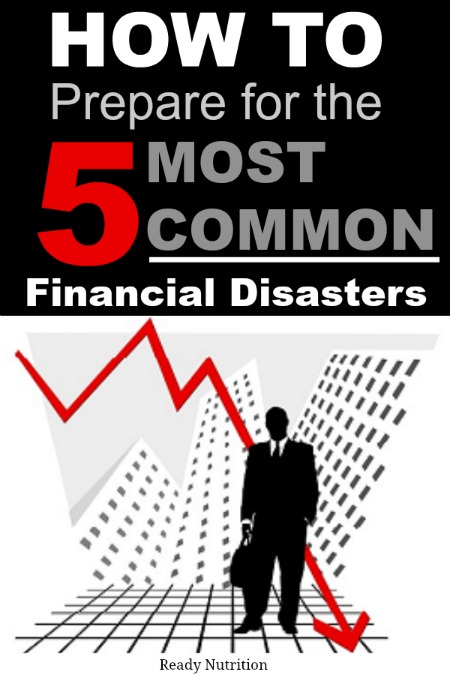
The worst financial disasters to affect an individual are often not due to the overall global economy and the bringing about of Armageddon. They are more personal and localized. We have a few tips to help you avoid financial ruin in the event one of these five most common financial horrors were to strike.
Families often have to deal with the loss of jobs and unexpected medical bills. But having a plan in place could help you avoid losing even more of your hard-earned money should the unthinkable happen. Many Americans go about their day with absolutely no care in the world and not even an extra can of peas on the shelf. Many don’t think to prepare for an event, even a localized or more personal one and have often looked down on those of us who have these plans in place. In fact, only 16% of Americans say they are prepared for a disaster like one of the five we will cover.
*Keep in mind, some of these go hand in hand. For example, if you have major medical bills because of a car accident, you’ll also have added car expenses. If you are dealing with the death of a spouse who is employed, you also now must deal with the loss of a job.
Getting out of debt (especially credit card debt) should be the first order of business when planning for any financial crisis. Paying off debt means that in the event of a financial disaster, you’ve encountered a setback and not a game changer in your life. Start by no longer using credit cards. Keep one for emergencies if you can be responsible with it, otherwise, cancel them as you pay them off. The best way to pay off debt is to cut back where you can and use that savings to apply to debt. Start with the smallest debt and pay that off. Once it’s gone, move on to the next highest bill and pay that off using the money you were applying to the smaller and now paid off debt. Work your way up until you’ve paid off your cars and eventually, your mortgage.
So what are five of the most common financial disasters and how can you prepare? We’ll start with the first and most obvious one and focus more on the financial aspects of preparations.
NATURAL DISASTER
A natural disaster could be just about anything, from an earthquake or tornado to a hurricane or wildfire. If a natural disaster strikes, even those who are prepared will sometimes lose their provisions. The best thing to do in this situation is to have a backup shelter planned, or be able to quickly create one on your property (there are many reasons why you should do everything possible to avoid FEMA camps and shelters in the aftermath of a disaster in which hundreds of thousands have lost homes). But focusing on the financial aspects of a natural disaster means you should also make certain you have insurance in place so you can quickly begin repairs on your home. If you’ve lost everything, the more money you’ve got saved and the better your insurance plans, the better off you’ll be. We saw evidence of this first hand in the aftermath of the hurricanes that struck in Texas. Don’t just get insurance to “follow the law” so you can get your couple thousand dollars from FEMA, you should have insurance that covers likely disasters in your area. You should have enough in a savings account to cover whatever amount of deductible you’ve chosen as well. This way, rebuilding will begin immediately.
JOB LOSS
In the event that there’s a job loss, especially if the loss is that of the primary breadwinner, savings will be your key to survival. Start looking for work immediately, although that seems too obvious. You should have been working toward becoming debt free, but if you’ve got bills that need to be paid, you will have to consider cutting back everywhere. Cancel your extra TV channels or lower your cell phone bill. Often cutting back on these two things can save about $100/month or more. Be more frugal in general until there is a steady source of income again, and rely on your savings account. There’s no set amount of money you “need” because it would be based on your personal lifestyle and how large of a family you have. Obviously, if your rent is $400/month, your savings doesn’t need to be as big a person’s whose mortgage is $2500/month. So consider adding up your bills (mortgage/rent, car payments, electricity, water etc.) and make sure to tack on several hundred just in case. You’ll then know how much money you’ll need monthly and can begin saving or cutting back to ensure that number stays at a manageable level. Don’t forget about these unemployment tips either.
CAR EXPENSES And MEDICAL EMERGENCIES
You should havan extra savings account with money set aside for unforeseen car expenses and/or medical expenses. You should have enough saved to cover the cost of the deductible on all cars and you should save enough to cover the deductible on medical expenses. Look at your insurance policies (if you don’t have insurance, begin saving as much as you can now because vehicle expenses an medical are are far from cheap) and determine how much you’ll need. Often, car expenses and medical emergencies hit us like a ton of bricks and few Americans have adequate savings for either. Other than saving in advance, there’s not much else that can be done. Humans get sick or hurt and cars break down. Save for these future events now, just in case.
MARITAL ISSUES SUCH AS DIVORCE
This one is difficult because all divorces, much like all marriages, are different. Preparing for a divorce will take some major inward reflection on the part of the person who wishes to prepare for this particular financial crisis, and that’s exactly what it could be. Lawyers don’t work for free, court documents are added expenses, material possessions will have to be divided, and money would need to be available for one spouse to move out. You could also face the expenses of selling the shared home. Often, retirement savings accounts can even be split or given if one spouse desires that of the other. But the best advice we can give is to avoid being vindictive should you find yourself in this position because a bitter attitude will only cause more financial hardship as your soon-to-be-ex-spouse fights back. Seeking professional advice could be advantageous.


The best way for MEN to deal with divorce is….DON’T GET MARRIED to begin with. Divorced courts have been biased against men from day one. The post-divorce suicide risk for men increases 9 times, but remains unchanged for women. Mainstream media and feminist presentations on this subject all too odten ignore this ghastly reality.
Really? I was a stay at home mom raising our 3 kids. When the youngest turned 18, he filed for divorce. Since I was dependent on his income and had no clue he would divorce me, I was stunned. When he left, he took his 100,00.00 salary with him. I was left with nothing. Because of this, I couldn’t hire a decent lawyer. But he did. After 24 years of marriage, he convinced the judge that I didn’t need schooling for job skills and that I should live on a subsistence. The judge agreed with him and he was ordered to give me $1000.00 per month! That was in 2002. My income at this time, in 2021, is $1185.00. Meanwhile, he’s retired and still takes in over $80,000. a year. If course he was remarried within the year and is living happily ever after. Meanwhile, I’m still on a subsitence. And yes I appealed the ruling but to no avail. I think the judge was biased toward men! You judge!